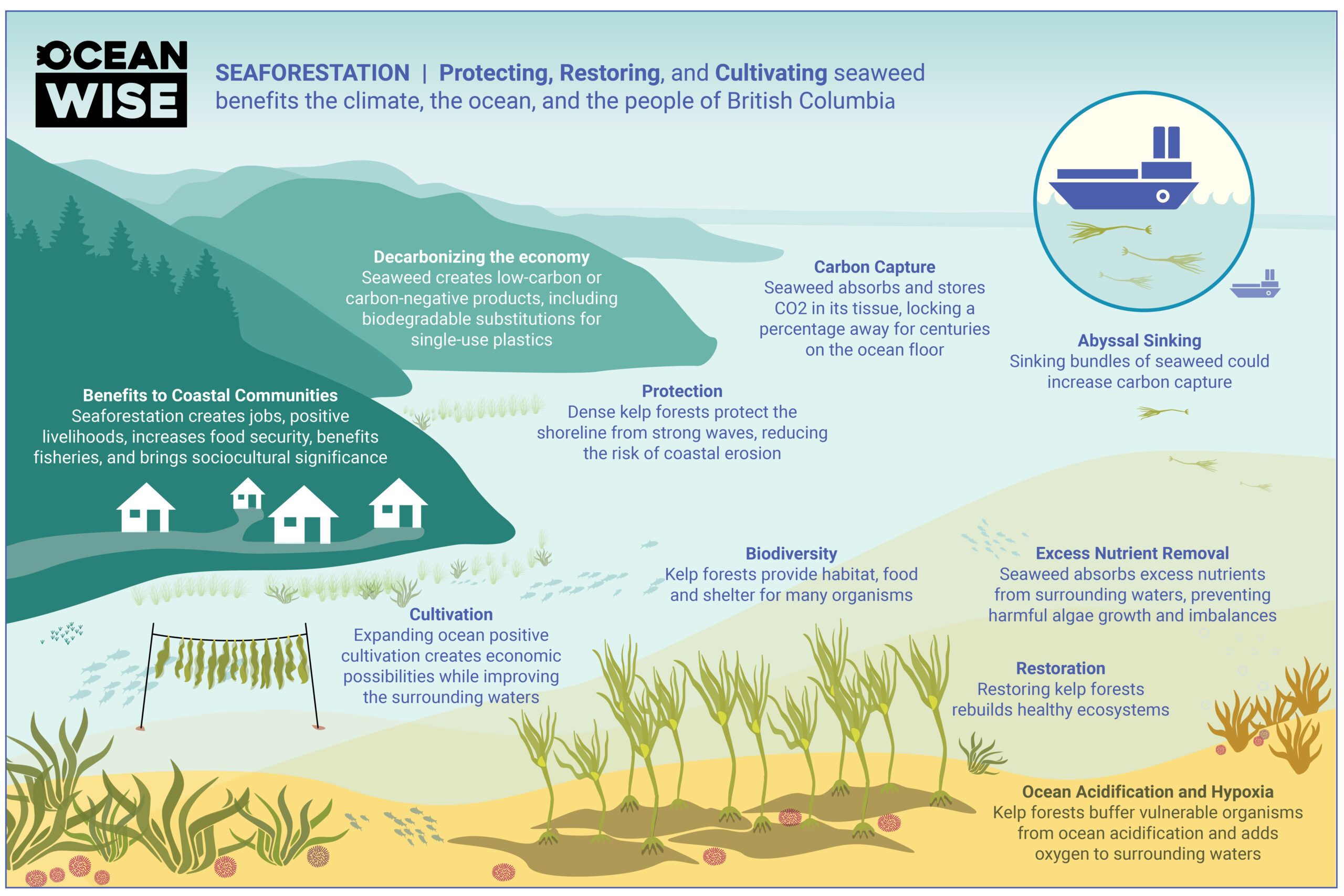Vancouver, Canada (June 27, 2022): As the UN Ocean Conference kicks off in Lisbon Ocean Wise releases a new report highlighting the economic, social and environmental potential of kelp forests in British Columbia.
By expanding kelp restoration, protection and cultivation, British Columbia can provide significant removal of harmful greenhouse gases from the atmosphere, while realizing several co-benefits for the ocean, coastal communities and marine life, says a new report by conservation group Ocean Wise. The report, titled Seaforestation: Benefits to the climate, the ecosystems, and the people of British Columbia, argues that Canada should pursue seaforestation at scale – the restoration, planting, management, and care of underwater kelp forests – as a no-regrets climate solution. In addition to removing carbon dioxide from the atmosphere seaforestation also improves the health of ocean ecosystems, restoring coastal fisheries, and creating environmentally focused jobs in British Columbia.
“Seaforestation can be another tool, in addition to significant emission reductions, in the fight against climate change. Given the wide array of benefits we see from kelp forests, and the potential to restore these important habitats, there is little reason not to innovate ways to scale responsible restoration. However, we need financial and regulatory incentives to drive seaforestation at scale and tap into the vast potential of the underwater forests of British Columbia” said Andrew Lang-Wong, the main author of the report.
The report finds that the coast of British Columbia is prime habitat for kelp abundance and species diversity. Dr Alejandra Mora-Soto, lead author of one of the studies in the report, estimates at least 190 km2 of kelp between the Straight of Georgia and Prince Rupert alone, capturing over 7,755 metric tons of CO2 every year – the equivalent emissions of heating 3,900 homes using natural gas.
“The ocean is by far the largest carbon reservoir on the planet, and the seaforestation of kelp forests, which absorb carbon, is an emerging opportunity that should be leveraged. We need every tool at our disposal to fight climate change. As a former tree planter, I’m very enthusiastic about the opportunity for seaforestation to reduce carbon emissions, while also increasing habitat for various sea life.” Honourable Joyce Murray, Minister of Fisheries, Oceans and the Canadian Coast Guard
With significant declines in kelp beds over the past three decades on both Pacific and Atlantic coasts there is a significant opportunity to restore lost kelp forests, and in the process add significant capture of CO2. The potential of kelp as a climate solution is not only what it captures today, but also what it can capture in the future, if restored and expanded responsibly and in areas likely to withstand the impacts of increased warming.
Nature-based climate solutions, like tree planting, have become widely adopted in the fight against climate change. Kelp offers similar opportunity and benefits but, unlike land-based forests, offers sustained carbon removal year after year due to its extraordinary growth speed and biomass turnover, without the risk of loss due to fire. Additionally, kelp can be cultivated for commercial harvesting while still capturing carbon – generating a continuous flow of economic, ecological and social benefits.
Kelp forests generate over 2.1 billion dollars in potential value annually to fisheries in British Columbia. And the underwater forests buffer vulnerable species from the impacts of ocean acidification, help clean the water by absorbing excess nutrients, and protect coastlines from erosion by dampening the impact of waves.
“Do no harm is not good enough for the oceans, we must rebuild marine life. This new report shows that Canada can be the global trailblazer for the responsible restoration, cultivation and protection of kelp in ways that maximize the climate, ecosystem and people benefits” added Dr Carlos Drews. “The opportunity for seaforestation in British Columbia is to take it to scale, responsibly, maximizing its social, climate and ecosystem benefits”
What can be done
Some things that individuals, organizations and governments can do to restore kelp forests include the following.
Governments can:
- Invest in the research and development to responsibly scale seaforestation techniques
- Invest in a site-selection protocol that maximizes environmental, economic and social returns
- Create a framework to facilitate scaling of responsible seaforestation
- Invest in better mapping, monitoring, and protection of existing seaweed forests
- Create financial incentives to scale responsible seaweed cultivation
Academics and other organizations can:
- Create a seed bank to preserve the genetic diversity of British Columbia’s kelp
- Continue to study kelp strains to identify those with the most beneficial properties
- Expand ocean and climate literacy programs educating British Columbians on the benefits of seaweed
-30-
About Ocean Wise
Ocean Wise is a global conservation organization on a mission to protect and restore the world’s oceans. Focused on education, research and direct-action conservation, Ocean Wise equips and inspires youth, citizens, businesses and governments to take action through initiatives like Shoreline Cleanup, Sustainable Seafood, Seaforestation, the WhaleReport app, and Plastic Reduction. Learn more at ocean.org
Media Contact
Ocean Wise Public RelationsOcean Wise Conservation Association
[email protected]’

